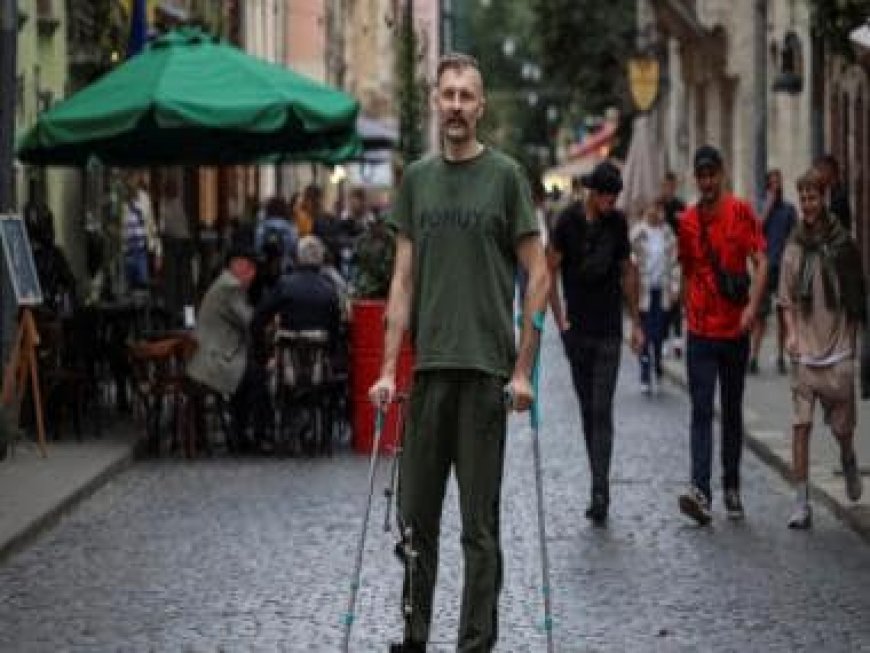Ukraine must be prepared for long war against Russia, say veterans
Ukraine must be prepared for long war against Russia, say veterans

Oleksandr Yabchanka, who was recovering from his third combat wounded, issued a warning to Ukrainians who he claimed might be putting their heads in the sand regarding the conflict with Russia.
“Guys, sooner or later it will catch up with you,” said Yabchanka, who was back home in western Ukraine waiting for his wounded leg to heal before returning to his unit.
The Lviv-born doctor, 42, who served as a health ministry consultant before taking leadership of a platoon in the 1st Separate “Da Vinci Wolves” Battalion, has been engaged in combat from the beginning of the conflict.
Coffee dates and cocktail parties provide some respite from periodic air strikes and stories of civilian losses while the two forces battle it out on the front lines in Lviv and other parts of Ukraine.
While Ukrainians are largely united, fighters like Yabchanka worry that some are disconnected from reality, as seen by the soldiers: that the battle might go for years and require a far larger number of people to fight, and that a Russian defeat should not be taken for granted.
After Russia’s full-scale invasion in February 2022, encouraged by their military’s resiliency and Western assistance, Ukrainians united behind the cause, supporting President Volodymyr Zelenskiy’s administration, and in many cases, taking up arms.
19 months later, public morale is still high and the troops are still hailed as heroes. Conversation still revolves around individual plans for “after the victory”.
Despite the fact that Russian forces failed on the battlefield in 2022 and enlisted thousands of prisoners to replenish their ranks, Ukrainians continue to frequently regard Russian forces as incompetent.
However, despite indications that Russian forces are becoming more successful, Kyiv’s much-heralded summer counteroffensive has only made marginal progress, and losses are growing on both sides.
As the war drags on, Ukraine is reforming military recruitment, including by removing directors of regional recruitment offices, punishing draught evasion, and changing the policies of medical exemptions from serving on the front lines.
Even though most men between the ages of 18 and 60 are prohibited from leaving the country, they haven’t been called up yet.
Analysts claim the government must take into account social stability and the larger economy even though no changes to the general mobilisation plans have been made.
It is natural for a community under attack to mythologize its defenders in a struggle for survival, according to Adriana Romanko, a psychiatrist who heads the UAID volunteer organisation that provides the military.
But pointing to a popular slogan – “I believe in the AFU (Armed Forces of Ukraine)” – she added that it also risks distancing people from those who are fighting.
“This slogan puts people into the infantile position of having this ‘Big Dad’, in this case the AFU, come along and take care of everything,” said Romanko.
Numerous Ukrainians who are not actively fighting in the conflict continue to support the cause. The Ilko Kucheriv Democratic Initiatives Foundation estimates that 68% of people volunteer or make donations to support the military or those affected by the conflict, up from 61% in December.
Another survey conducted by the polling company Rating Group revealed that almost the same number of people stated that a family member or acquaintance had fought or was presently fighting.
However, combat-tested veterans have voiced concern in local media about the impact of what they see as a romanticised vision of the conflict or a sense of impatience fostered by some public figures and journalists on Ukraine’s long-term resilience.
“It could turn out that the situation at the front will worsen, and we need to be ready for that,” Bohdan Krotevych, the chief of staff for the Azov Brigade, posted on Telegram in late August, urging Ukrainians to steel themselves and stop asking how long the war will last.
Those who are close to someone battling, according to Yabchanka, who has a Cossack-inspired moustache and hairdo, tend to be more realistic. But if they were called up, he was concerned that many men of military age would not be ready for the reality of intense close battle and powerful artillery bombardment.
“This is someone’s husband, someone’s son, someone’s father,” he said.
“It’s a Ukrainian over whom it will be painful for me when, God forbid, he’s killed.”
(With agency inputs)
What's Your Reaction?


























































